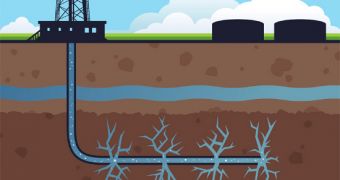Colorado has finished work on a new set of rules intended to improve on the ecological footprint of oil and gas exploitation activities currently carried out across its territory.
In doing so, it has become the first state in the US to take steps towards reducing methane and other pollutants emissions resulting from fracking.
Media reports say that the rules in question were first introduced back in last year's November.
They are the result of a collaboration between three major oil and gas producers, i.e. Noble Energy Inc., Encana Corp. and Anadarko Petroleum Corp., and the Environmental Defense Fund.
At the time when this new set of regulations was first proposed, Larry Wolk, Colorado’s state health chief, said that it would translate into a 92,000-ton drop in the overall amount of air pollution that the state produces annually.
To put things into perspective, he further detailed that this drop in air pollution would be the equivalent of banning the use of cars across the state's entire territory for a period of one year.
The rules were given the thumbs up by the Colorado Air Quality Control Commission this past Sunday.
Under this new set of regulations, companies that are in the business of carrying out oil and gas exploitation activities will be required by law to fix any persistent leaks in the tanks and pipes that they own and operate.
More precisely, Oil Price tells us that oil and gas companies must see to it that they capture as much as 95% of the emissions stemming from said sources.
Once such emissions capture technology is set in place and becomes operational, air concentrations of volatile organic compounds and methane are expected to be reduced to a considerable extent.
As shown by several studies, volatile organic compounds contribute to the formation of smog. Methane, on the other hand, has been documented to be a very potent greenhouse gas.
Consequently, Colorado’s decision to better regulate emissions of these two air pollutants can only yield major benefits as far as protecting both the environment and public health is concerned.
“The rules will help Colorado prepare for anticipated growth in energy development while protecting public health and the environment,” Governor John Hickenlooper said in a statement, as cited by Sustainable Business.
“They represent a significant step forward in addressing a wider range of emissions that before now have not been directly regulated,” he went on to explain.
Apart from upping the amount of emissions originating in their tanks and pipes that they capture, oil and gas companies will also be required by law to take steps towards improving on their leak-detection methods and capabilities.
“We all want clean air, and we believe keeping methane in the pipeline and out of the air is the right thing to do,” Noble Energy Senior Vice President Ted Brown commented on this initiative, as cited by Think Progress.

 14 DAY TRIAL //
14 DAY TRIAL //